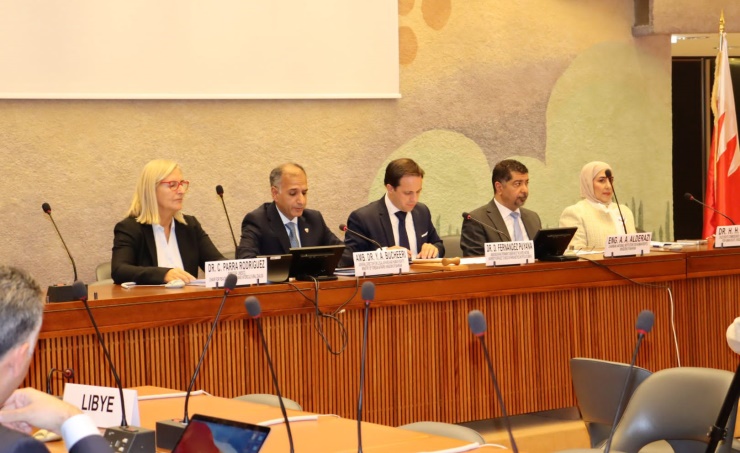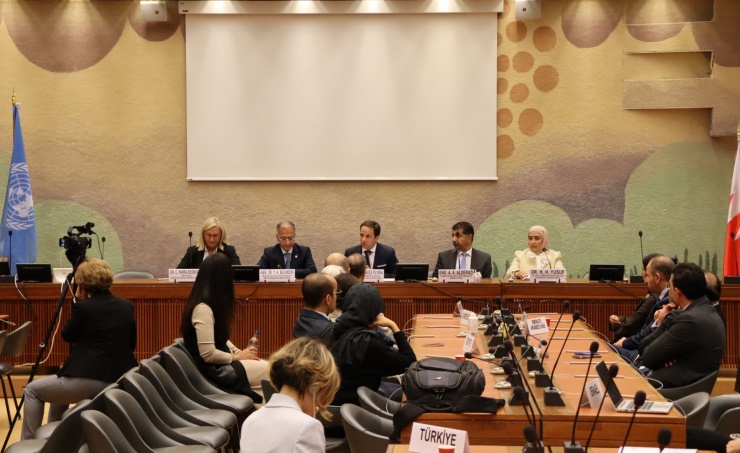NIHR Oganises a Panel Discussion in Geneva on the Mechanism of Work of the Commissioner for the Rights of the Child

In cooperation with the Ministry of Foreign Affairs and the Permanent Mission of the Kingdom of Bahrain to the UN Office in Geneva, the National Institution for Human Rights (NIHR) held a penal discussion on the sidelines of the 54th session of the UN International Human Rights Council, in light of the step taken by the NIHR to establish the position of the Commissioner for the Rights of the Child, in the presence of a number of heads and representatives of permanent missions to the UN office, the Office of the High Commissioner for Human Rights (OHCHR), representatives of the relevant UN agencies, the Secretariat of the Committee on the Rights of the Child, and an elite group of jurists working in the field of human rights who participated in the work of the 54th session of the Human Rights Council.
This panel discussion was held with the participation of Eng. Ali Ahmed Al-Dirazi, Chairman of the NIHR, Ambassador Dr. Yusuf Abdulkarim Bucheeri, Director-General of Legal Affairs and Human Rights at the Ministry of Foreign Affairs, D. Houria Hassan, NIHR Commissioner for the Rights of the Child, Prof. Carmen Parra Rodriguez, Director of the UNESCO Chair for Peace, Solidarity and Intercultural Dialogue, and Dr. David Fernánez Boyana, Ambassador and Permanent Observer of the UN University for Peace to UNESCO in Paris and the UN Office in Geneva.
The panel discussion addressed the role and competencies of the work of the NIHR Commissioner for the Rights of the Child, international community's participation in the advanced image of positive strategic partnerships based on mutual trust in the field of exchanging expertise and best practices in the field of protecting and promoting human rights, and the impact of this on the practical reality in establishing the position of the Commissioner for the Rights of the Child in the Kingdom of Bahrain.
The event also focused on spreading deep awareness among frameworks and agencies concerned with human rights in general and children's rights in particular, within the international system, while demonstrating the extent of progress made by the Kingdom of Bahrain towards the actual implementation of recommendations of the Universal Periodic Review (UPR) by creating this effective type of national mechanisms.
During the event, Engineer Ali Ahmed Al-Dirazi reviewed the efforts of the Kingdom of Bahrain and its keen interest in issues related to children through the issuance of the Children’s Law and the Law of Restorative Justice for Children and their Protection from Abuse, in addition to the Kingdom’s accession to the United Nations Convention on the Rights of the Child (UNCRC) and the two Optional Protocols.
The NIHR Chairman stated that the creation of the position of Commissioner for the Rights of the Child came through the powers stated in the NIHR's law, due to the utmost importance of this issue in preserving the best rights of children and preventing any violations that may affect their lives and upbringing, expressing his hope that the creation of the position of the Commissioner for the Rights of the Child would be a tool towards achieving further efforts to promote and protect children's rights in the kingdom of Bahrain, which leads to excellence in achieving the NIHR's vision and mission by making the culture of human rights a way of life that is felt by all citizens and residents without discrimination, by involving everyone in creating a better practice of human rights.
For his part, Ambassador D. Yusuf Abdulkarim Bucheeri, Director-General of Legal Affairs and Human Rights at the Ministry of Foreign Affairs, confirmed that the qualitative step that is the first in the Arab world that the NIHR took at the beginning of this year, which is the inauguration of the position of Commissioner for the Rights of the Child, would not have been achieved without the availability of a set of important objective factors, most notably the Kingdom of Bahrain’s ratification of the Convention on the Rights of the Child (CRC) in 1992, and the two Optional Protocols on the Involvement of Children in Armed Conflicts, the Sale of Children, Child Prostitution and Child Pornography attached thereto, in addition to acceding many other international conventions such as the Convention on the Elimination of All Forms of Discrimination against women (CEDAW), which enabled the Kingdom of Bahrain to create frameworks and develop national programmes, policies and legislation that are consistent with the international standards set by these conventions in the field of protecting and promoting children’s rights.
The Director-General of Legal Affairs and Human Rights stated the Kingdom of Bahrain's keenness to cooperate with contractual and non-contractual mechanisms that affiliate to the UN, and to implement their final recommendations related to policies and measures aiming to enhance human rights at the national level, especially as the issue of the Commissioner for Human Rights was recently raised in a set of recommendations of the Treaties Authority as well as during the 4th session of the Universal Periodic Review (UPR) mechanism for human rights for 2022. Accordingly, the NIHR's decision to take the initiative on its own to put into effect all the recommendations of the contractual and non-contractual committees concerned with the subject of the Commissioner for the Right of the Childs, through the powers granted to the NIHR under its Establishment Law, is clear evidence of the Kingdom of Bahrain’s seriousness in implementing the recommendations of the contractual and non-contractual committees and its sincere desire to cooperate with them.
Dr. Hooreya Hassan, NIHR Commissioner for the Rights of the Child, also provided a comprehensive review of the tasks and responsibilities carried out by the Commissioner, which are based on the same competencies assigned to the NIHR and contained in its Establishment Law No. (26) of 2014, amended by the Decree Law No. (20) of 2016, which stipulates that it has a general mandate to represent the opinions of children and youth, defend issues related to children’s rights, study national legislation and verify its compatibility with relevant international agreements, follow-up on issues facing children, and work to protect and promote their best interests, follow-up on new policies and legislation and their impact on their rights, conduct research and studies related to the rights, opinions and best interests of children, with the authority to receive their complaints and work to resolve them, provide the necessary support and assistance when needed, and enhance close cooperation between the Commissioner, government agencies, civil society institutions, and relevant regional and international non-governmental organisations.



